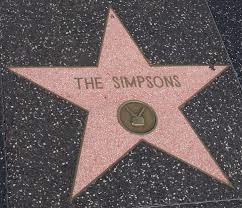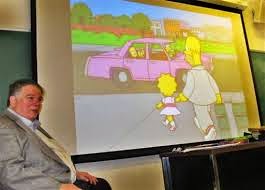Using The Simpsons to Enhance Literature at Every Grade Level in High School kids and teens
Even though Homer, Marge and their three children have remained the same age as when the series began, "The Simpsons" just had its twentieth birthday. Its television debut happened on Dec 17, 1989, and no one dreamed then what a hit the show would remain for the next two and a half decades.
I began my high school teaching career just few years before Homer and
his family appeared for the first time, but I refused to watch the show
until it was halfway through its first season. The teenagers I had in
class were buzzing about the show, so I assumed it was just a vulgar
flash in the pan.
To prove to the adolescents that "The Simpsons" was certainly not destined to be a classic, I decided to watch an episode. As "Homer's Night Out" filled my TV screen, I found myself admiring the show's approach and its original humor.
One year later I was completely hooked on the series, and I have even found it a great educational tool in my Language Arts classroom. Here are ten episodes that can be shown to students to enhance the themes of literature studied in high school classrooms.
"Bart Sells His Soul"
I used this episode from season seven at several different grade levels to complement works about deals with the devil. My juniors read Washington Irving's story "The a Devil and Tom Walker" while my sophomores read Stephen Vincent Benet's play "The Devil and Daniel Webster."
"Lisa the Skeptic"
This classic from season nine can be teamed with The Iliad, when Cassandra questions the acceptance of the Trojan horse. The episode works even better with the short story "A Very Old Man with enormous Wings."
"Homer's Odyssey"
Obviously from the title the plot from this season one gem is a take on some of the events from the blind Greek poet's epic about the Trojan War, a work most freshmen throughout the country are required to study. The Sirens Homer Simpson encounters are the frightening images of his sisters-in-law and, when Circe turns his men into pigs, Homer eats them.
"Das Bus"
The bus from Springfield Elementary crashes in season nine, leaving Bart, Nelson, and all the other kids stranded on an uninhabited island. Although the entire show references the sophomore-level novel Lord of the Flies, the best scene is when the bully boys use Milhouse's glasses to start a fire similar to the one Jack created by Piggy's glasses in the book.
"The War of the Simpsons"
Any literary work about choosing between girls and dreams can be supplemented by this show from season two, where Homer blows off his marriage retreat to catch the legendary fish. It is a perfect fit for the freshman short story "The Bass, the River and Sheila Mant" but I also used it with "Araby" by James Joyce in a Brit Lit senior class.
"Million Dollar Maybe"
Homer wins the lottery but soon after runs into trouble, making this season 21 episode a good companion piece for "The Lottery" by Shirley Jackson in junior level American Lit or for "The Pardoner's Tale" when seniors read Chaucer's The Canterbury Tales.
"Treehouse of Horror XVI"
In season 17 of the Halloween specials the writers parody "The Most Dangerous Game," required reading for nearly every freshman in the U.S. Mr. Burns is the General Zaroff-like character who hunts his fellow human beings for sport.
"Treehouse of Horror I"
Edgar Allan Poe's Classic poem "The Raven" is recited verbatim by Homer and Bart, whose face appears with the body of the ominous bird in the title.
"At Long Last Leave"
Surprisingly, it took until season 23 before the town finally exiled the Simpsons from Springfield, providing a lighter side of the theme of the novel Things Fall Apart by Chinua Achebe.
"Tales from the Public Domain"
A three segment episode during season 13 features Shakespeare's Hamlet in one of its parodies. Bart, much like the speaker of "To be or not to be," tries to avenge his father's death from the hands of his new stepfather Moe.








Comments
Post a Comment
thank you